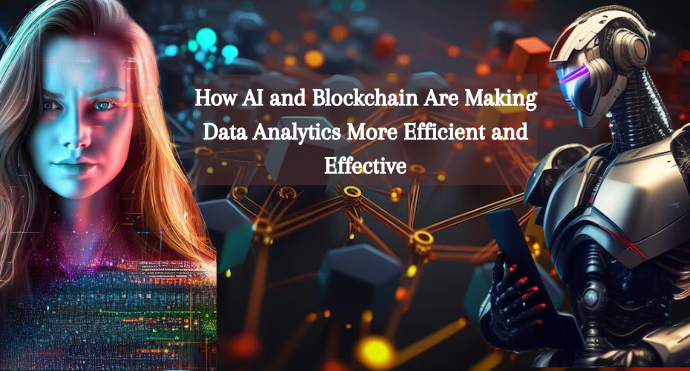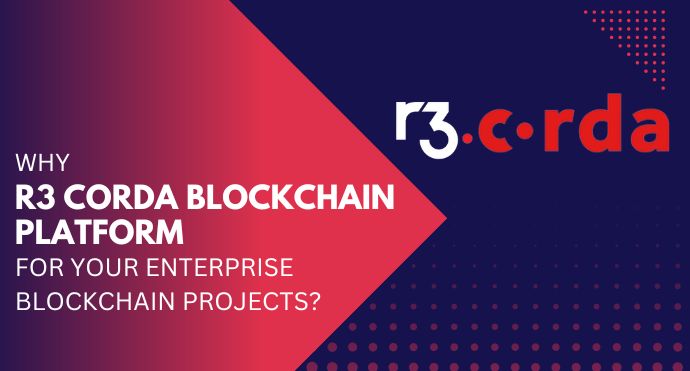In today’s data-driven world, organizations are constantly seeking innovative technologies to improve the efficiency and effectiveness of their data analytics processes. Two powerful technologies, artificial intelligence (AI) and blockchain, have emerged as game-changers in the field of data analytics. This blog post explores how AI and blockchain are revolutionizing data analytics, offering enhanced efficiency, security, and trust in the analysis of vast amounts of data.
1. Leveraging AI in Data Analytics:
Artificial intelligence plays a vital role in data analytics by automating and streamlining various tasks, enabling organizations to extract valuable insights from their data more efficiently. Here are some key ways AI is enhancing data analytics:
a. Data Preprocessing and Cleansing: AI algorithms can identify and handle missing data, outliers, and inconsistencies, reducing manual efforts and ensuring data quality for analysis.
b. Advanced Data Analytics: AI-powered techniques, such as machine learning and deep learning, enable predictive and prescriptive analytics, uncovering hidden patterns, correlations, and trends that human analysts may overlook.
c. Natural Language Processing (NLP): NLP algorithms enable the extraction and analysis of unstructured data, such as text documents and social media posts, expanding the scope of data analytics and providing valuable insights from diverse sources.
2. Blockchain’s Impact on Data Analytics:
Blockchain technology, renowned for its decentralized and immutable nature, offers several advantages in the realm of data analytics. Here’s how blockchain is transforming the data analytics landscape:
a. Data Integrity and Security: Blockchain ensures data integrity and security by providing an immutable and transparent ledger that records all data transactions. This feature enhances trust in the data being analyzed, as any tampering attempts can be easily detected.
b. Data Sharing and Collaboration: Blockchain enables secure and efficient data sharing among multiple parties. Data analytics platforms built on blockchain allow organizations to share data while preserving privacy and granting selective access to authorized participants.
c. Smart Contracts for Data Analytics: Smart contracts, self-executing agreements on the blockchain, streamline data analytics collaborations by automating contractual obligations, such as data sharing, payment terms, and result delivery.
3. Synergies between AI and Blockchain in Data Analytics:
When AI and blockchain technologies are combined, their synergistic effects can further enhance the efficiency and effectiveness of data analytics processes. Here are some notable synergies:
a. Enhanced Data Quality: AI algorithms can analyze data patterns and detect anomalies, ensuring data integrity within the blockchain. This collaboration enhances the accuracy and reliability of analytics results.
b. Privacy-preserving Analytics: AI techniques like federated learning enable data analysis without transferring raw data, preserving privacy. Blockchain ensures the integrity and transparency of the analytics process.
c. Auditable and Transparent Analytics: Blockchain’s immutable nature allows for a transparent and auditable trail of data analytics activities. This feature enhances trust and accountability, crucial for industries like finance, healthcare, and supply chain management.
Here are some specific examples of how AI and blockchain are being used to improve data analytics:
Banks are using AI to automate fraud detection – AI can analyze large amounts of data to identify patterns that may indicate fraudulent activity. This can help banks to prevent fraud and protect their customers.
Retailers are using AI to personalize customer experiences – AI can analyze customer data to identify their preferences and interests. This information can then be used to personalize marketing campaigns and product recommendations.
Healthcare organizations are using AI to improve patient care – AI can analyze medical data to identify patterns that may indicate potential health problems. This information can then be used to prevent diseases and improve patient outcomes.
These are just a few examples of how AI and blockchain are being used to improve data analytics. As these technologies continue to develop, we can expect to see even more innovative and effective ways to use them to gain insights from data.
Benefits of Using AI and Blockchain for Data Analytics
There are many benefits to using AI and blockchain for data analytics. Some of the key benefits include:
Increased efficiency: AI and blockchain can automate many of the tasks involved in data analytics, which can free up human analysts to focus on more strategic tasks.
Improved accuracy: Blockchain can help to secure and share data more efficiently, which can improve the accuracy and reliability of data analytics.
Enhanced collaboration: Blockchain can make it easier to collaborate with partners and suppliers, which can lead to better insights and decision-making.
Reduced costs: AI and blockchain can help to reduce the costs associated with data analytics, such as the cost of data storage and processing.
Challenges of Using AI and Blockchain for Data Analytics
While there are many benefits to using AI and blockchain for data analytics, there are also some challenges that need to be addressed. Some of the key challenges include:
Data privacy: AI and blockchain can collect and store large amounts of data, which raises concerns about data privacy.
Security: AI and blockchain are complex technologies, and there are risks of security breaches.
Regulation: AI and blockchain are still emerging technologies, and there is a lack of regulation in some areas.
Despite the challenges: AI and blockchain have the potential to revolutionize data analytics. As these technologies continue to develop, we can expect to see even more innovative and effective ways to use them to gain insights from data.
Conclusion:
The convergence of AI and blockchain technologies brings immense benefits to data analytics. AI enhances the efficiency and accuracy of analysis, while blockchain ensures data integrity, security, and trust. This powerful combination enables organizations to unlock valuable insights from vast amounts of data, drive data-driven decision-making, and explore new frontiers in various industries. As these technologies continue to evolve, we can expect even more exciting advancements and opportunities in the field of data analytics.



